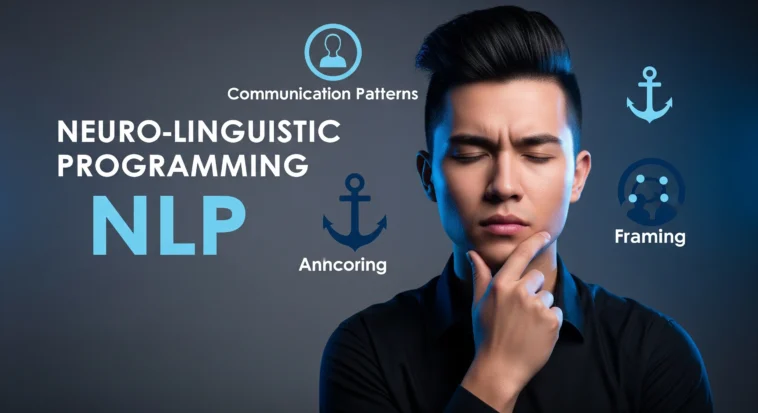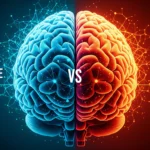
Neuro-Linguistic Programming (NLP) has fascinated coaches, professionals, and anyone chasing personal growth for years.
It promises to tap into the way your brain, language, and habits work together—kind of like having a “user manual” for your mind.
Some people swear by it, while others roll their eyes and call it hype.
The big question is: does science actually back it up?
This breakdown looks at what research really says about NLP—the wins, the flaws, and the gray areas—so you can decide for yourself whether it’s the real deal or just another shiny self-help trend.
What Is Neuro-Linguistic Programming?
Back in the 1970s, two guys—Richard Bandler and John Grinder—came up with NLP, a set of tools to help people understand and change how they think and act.
Think of it like hacking your brain’s software.
The Three Pillars of NLP:
- Neuro: How your brain and body take in the world
- Linguistic: How words shape your thoughts and actions
- Programming: The habits and patterns you can rewire
People who use NLP say it can help you talk better, ditch fears, smash self-doubt, and even copy the habits of super-successful people.
Some techniques? Anchoring (linking feelings to actions), reframing (changing how you see stuff), and modeling (imitating winners).
What makes NLP exciting is how fast it claims to work.
While traditional therapy might take ages, NLP fans say you can feel a shift in just a few sessions.
The Scientific Landscape: Current Research Findings
Positive research outcomes
Some studies show NLP does work in certain situations.
For example, a 2024 study with school kids found NLP helped cut down bad behavior and boosted focus, especially for kids over 9.
Imagine your teacher using a trick that helps the whole class chill out—it’s kinda like that.
In hospitals, NLP plus guided imagery helped heart surgery patients feel less pain and recover more comfortably.
That’s huge—mind hacks supporting body healing.
For self-growth, research suggests NLP can boost personal effectiveness and even help young people feel more confident and satisfied with life.
One study even tested “Integrated-NLP” for depression and found it could be a solid add-on to regular therapy.
Mixed results in Psychotherapy
When it comes to actual therapy, things get messier.
NLP-based psychotherapy (NLPt) has been tested more seriously, and results are all over the place.
Some studies show it works about as well as other therapies, but meta-analyses (basically big study mash-ups) show only moderate effects.
Think of it like trying out a new video game—it’s fun for some, glitchy for others.
The Critical Perspective: Significant Limitations
Systematic Reviews Show Limited Evidence
When scientists look at all the research together, NLP doesn’t hold up well.
Big reviews show little solid proof that it actually improves health outcomes.
So while a few studies sound exciting, the bigger picture is shaky.
The pseudoscience debate
A lot of experts straight-up call NLP pseudoscience.
Why? Because the theories behind it don’t have strong evidence, and many experiments fail to back it up.
Practitioners argue it just hasn’t been studied enough, but the mainstream scientific view is: “Nope, this isn’t science.”
Research quality issues
Most NLP research just isn’t that good.
Out of hundreds of studies, only a tiny handful were useful, and even those had flaws.
Many “studies” are really just single case stories, not proper experiments. Imagine trying to prove a new workout works by saying, “It helped my one friend.”
That’s basically what a lot of NLP research looks like.
Understanding the Research Divide
Why the Conflicting Evidence?
So, why do some studies say NLP works while others call it nonsense? A few big reasons:
- Method mess-ups: It’s hard to test NLP properly because everyone teaches it differently, and there’s no one “official” version.
- Publication bias: A lot of the “NLP works!” studies are tucked away in small journals or places that don’t have super strict science rules.
- Definition drama: NLP is a giant grab-bag of techniques. Testing “NLP as a whole” is like testing whether “sports” works—you’d get mixed results.
The nuanced reality
Some of NLP’s bad reputation comes from people focusing too much on its messy early studies while ignoring newer research.
To be taken seriously, the NLP community needs to step up—run cleaner, more legit studies, and prove what actually works.
Until then, it’ll stay stuck in that weird middle ground between hype and hard science.
Practical Implications: What This Means for You
When NLP might be worth considering
- In school stuff: NLP techniques can sometimes help calm behavior problems and manage triggers in kids — especially around age 9 and up.
- In medical support: Used with regular treatments, some NLP-style tools may ease pain and speed comfort after surgery — not a replacement, but a helpful extra.
- For self-improvement: If you like structured tricks and goal-hacking, NLP can give you practical ways to try new habits — but don’t expect magic.
- For talking to people: Some basic NLP communication tips can make you clearer and more persuasive in everyday chats.
Red flags to watch for
- Promises of instant, guaranteed transformation — if it sounds too good to be true, it probably is.
- Practitioners who brush off science or refuse to show credentials.
- Pricey certifications that promise you’ll become a guru overnight.
- Claims that NLP is a cure-all for everything.
Making informed decisions
- Check credentials: Pick practitioners with real training and honest claims.
- Be realistic: Treat NLP as one tool in your toolbox, not a miracle.
- Mix smartly: Use NLP alongside proven therapies, not instead of them.
- Track results: Don’t just go by how you feel — measure real changes (grades, sleep, anxiety levels) so you know if it’s working.
The Future of NLP Research
Areas needing investigation
If NLP ever wants a real seat at the science table, researchers have to level up. That means:
- Figuring out the “how”: We need to know why certain NLP tricks work when they do — not just take it on faith.
- Making it consistent: Right now, NLP is taught like a thousand different recipes. Science needs one clear version to test.
- Checking long-term results: Does NLP help for weeks, months, or years? Or is it more like a quick sugar rush?
- Head-to-head matchups: We need to see how NLP stacks up against proven therapies — like putting two athletes in the same race to see who really performs.
Emerging opportunities
Here’s where it gets interesting: some new studies suggest NLP works better when blended with evidence-based methods.
Think of it like mixing an energy drink with water — on its own it’s too much, but combined, it actually works.
This “Integrated-NLP” approach might be the key to unlocking more consistent, reliable results in the future.
Conclusion: A Balanced Perspective
So, is NLP the magic bullet people hype it up to be? Nope. But is it total nonsense? Also nope.
Here’s what the evidence says:
- Some NLP tricks can help in certain situations.
- Results depend a lot on the person and the context.
- It doesn’t have the scientific muscle that proven therapies do.
- The research is still small, but slowly growing.
For you, that means NLP can be one more tool in your personal growth toolbox — just don’t treat it like a miracle cure.
Use it alongside solid, evidence-based methods, not instead of them.
The real future of NLP isn’t about big promises; it’s about figuring out what actually works, for who, and when.
With better research, we’ll finally know if it’s a powerful hack — or just another shiny trend.



